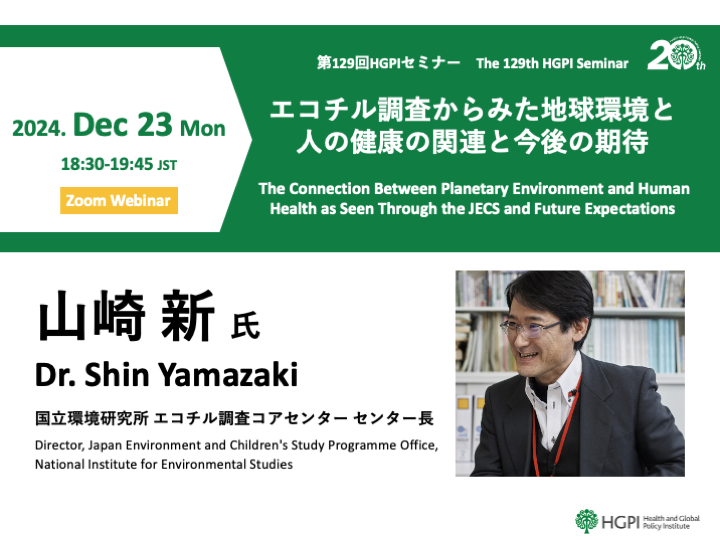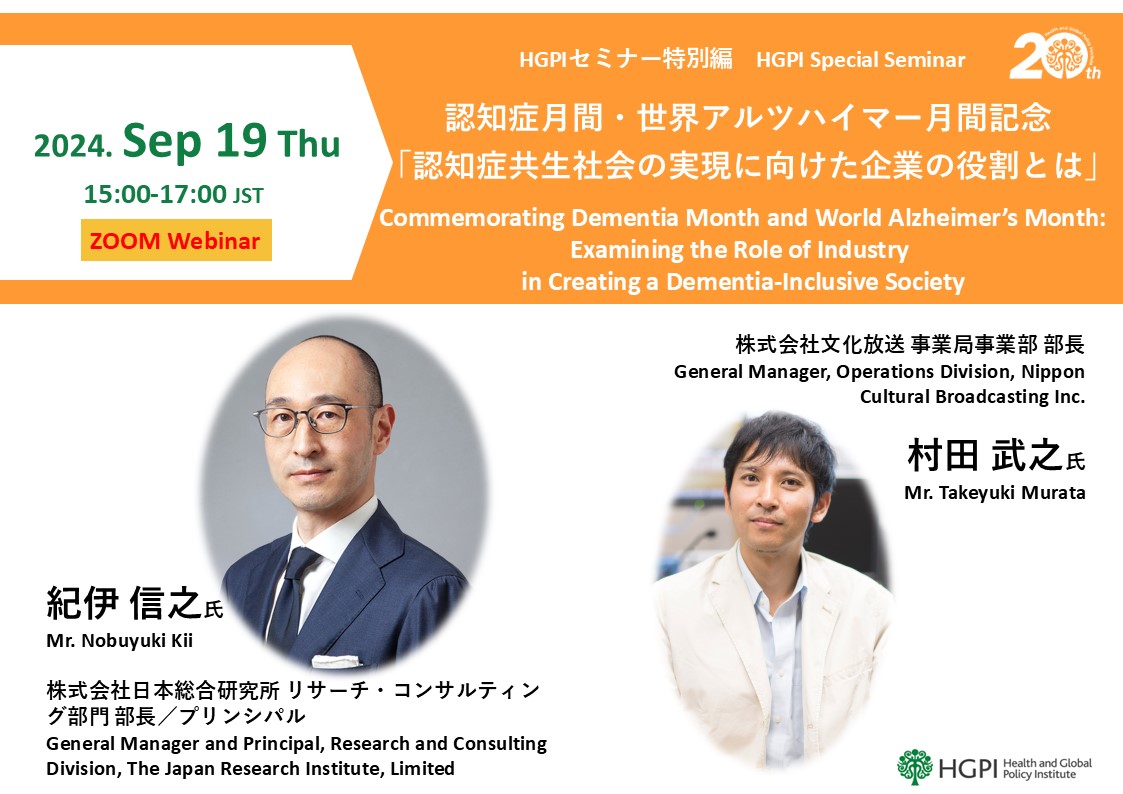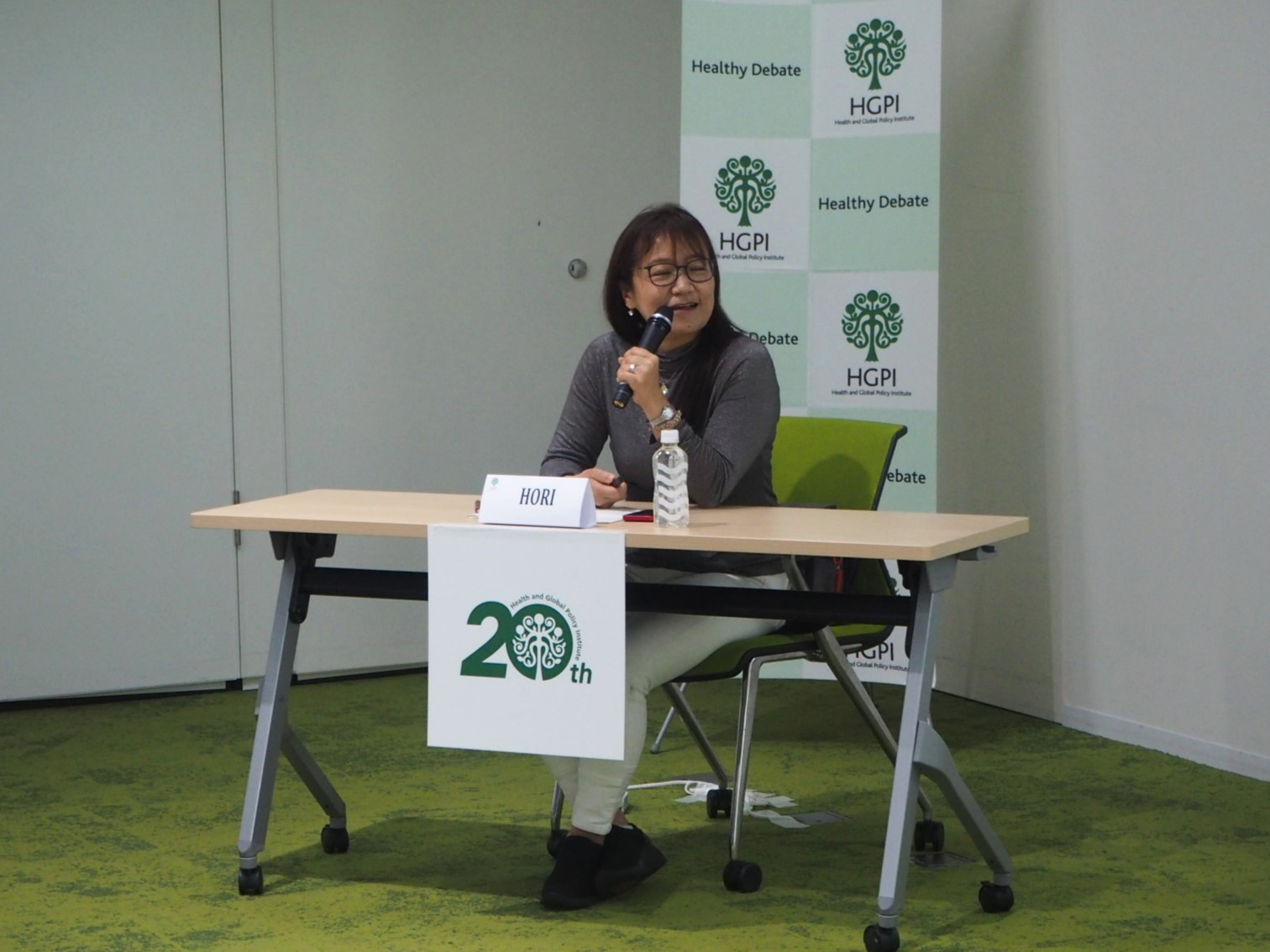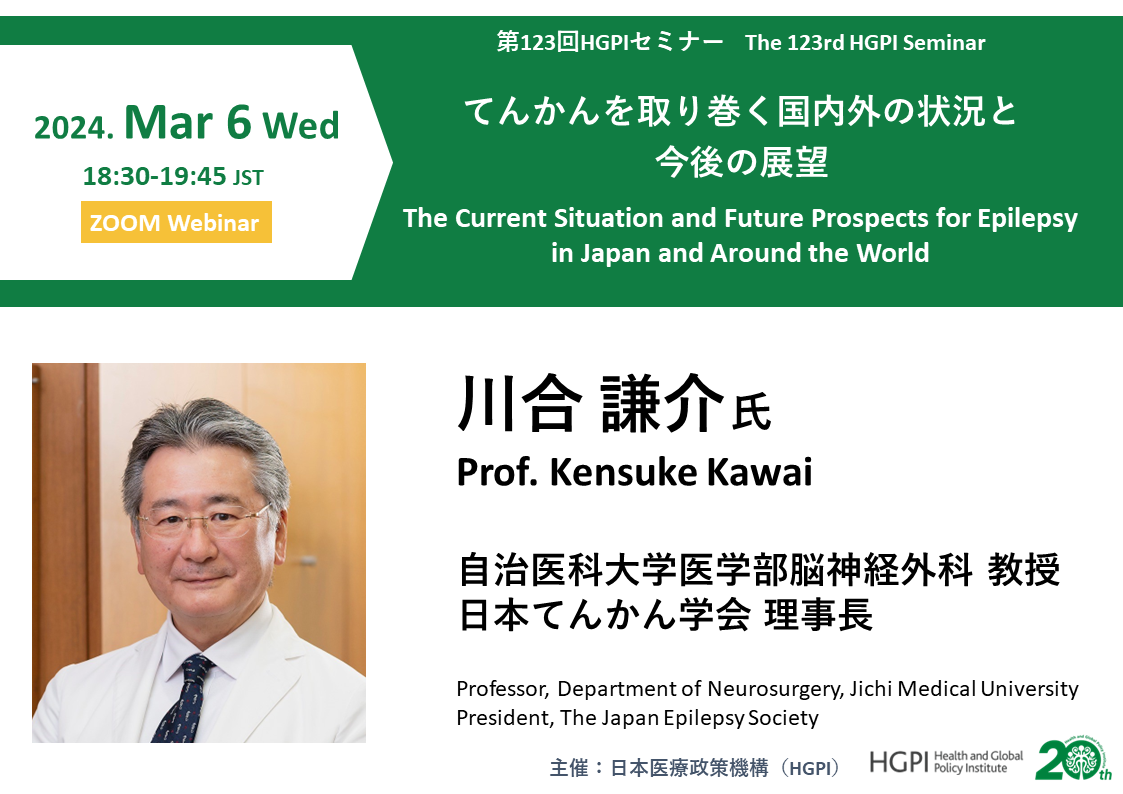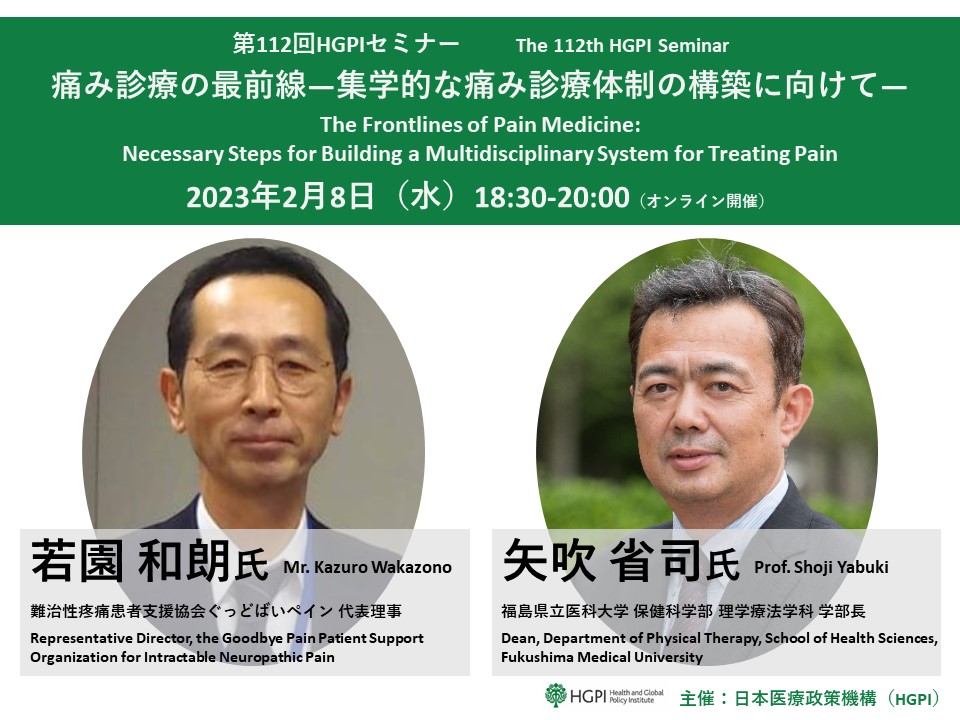[Event Report] (Webinar) The 126th HGPI Seminar: Considering the Present and Future of Cannabis-Derived Medicines in Japan to Mark the International Day Against Drug Abuse and Illicit Trafficking (June 24, 2024)
date : 12/13/2024
Tags: HGPI Seminar, NCDs, Other activities
![[Event Report] (Webinar) The 126th HGPI Seminar: Considering the Present and Future of Cannabis-Derived Medicines in Japan to Mark the International Day Against Drug Abuse and Illicit Trafficking (June 24, 2024)](https://hgpi.org/en/wp-content/uploads/sites/2/HGPI_20240624_126thHGPISeminar_REV.png)
For the 126th HGPI Seminar, we hosted Professor Ichiro Takumi, President of the Japanese Clinical Association of Cannabinoids (JCAC). In light of the latest developments in cannabis-derived medicines, Professor Takumi shared the historical background of cannabis and cannabinoids, their current status in Japan and overseas, and future issues in this area.
Key points of the lecture
- A revision of the Cannabis Control Act was enacted in December 2023 and will come into effect in or after October 2024. It will reclassify cannabis as a narcotic, which will open the door for its use for medical purposes like other narcotics. However, at the moment, there is only a single clinical trial being conducted with a drug derived from cannabis, and its only target is intractable epilepsy, a Designated Intractable Disease.
- In Japan, many people with intractable diseases have been using legal cannabinoid products (in which the main ingredients are derived from cannabis). While many of these products were banned after the revision of the Cannabis Control Act, cannabinoids can now be categorized and administered as medical treatments.
- Efforts to develop cannabis-derived medicines should not be limited to intractable epilepsy, but should advance with an eye on how to best secure patients’ existing access to cannabis-derived medicines and how to guide new patients to them in the future.
There are over 100 cannabinoids derived from cannabis and laws for their use to treat intractable epilepsy in Japan are being developed
The cannabis plant contains over 400 chemical compounds, some of which are cannabinoids that can only be found in that plant. The two main cannabinoids are cannabidiol (CBD) and Δ9-tetrahydrocannabinol (THC), which affects the central nervous system. In addition to these, there are more than 140 other cannabinoids. Among these substances, CBD is noteworthy for its anticonvulsant and anti-inflammatory properties, and clinical trials are currently being conducted in Japan to determine its potential as an anti-seizure drug for intractable epilepsy (also known as Dravet syndrome). One item that requires particular attention in the development of cannabis-derived medicines is the entourage effect, which examines the compound effects of each of the ingredients in cannabis, including its trace substances.
Japan enacted a revision of the Cannabis Control Act in December 2023 that is scheduled to come into effect on or after October 1, 2024. Under that revision, CBD and CBD products will be reclassified as cannabis-derived medicines, and it will even open the door for the use of THC for medical purposes. At the same time, CBD products containing more than a certain amount of THC will be treated as narcotics, and many products that are currently legal will become subject to regulation.
Cannabis-derived medicines have been in use overseas since the 19th century, there has been rapid progress in discussions on their use in recent years, and domestic clinical trials are currently underway
Discussions on the medical use of cannabis date back to the latter half of the 19th century, when British physician J.R. Reynolds reported on the effectiveness of cannabis to diminish epileptic seizures. Later, in 1980, Israeli researcher Raphael Mechoulam and his colleagues demonstrated its effectiveness for temporal lobe epilepsy. Then, in the U.S. in around 2014, CBD products became the subject of attention for their effectiveness in people living with Dravet syndrome, which attracted further attention to cannabis-derived medicines. This kicked off rapid progress in research in the U.S., where it was shown that CBD products with relatively low THC content were effective for suppressing intractable epileptic seizures. Then, in June 2018, the U.S. Food and Drug Administration (FDA) approved the first drug with CBD as an active ingredient to treat epilepsy.
Because Japan prohibited the use or prescription of cannabis-derived medicines under the Cannabis Control Act, such medications could not be prescribed even if they had completed clinical trials. This could be called a kink in the law. To address this, together with a patient group in Okinawa Prefecture, we submitted a written request to House of Councilors member Mr. Kozo Akino. Based on these circumstances, Mr. Akino then submitted a question to the Diet in March 2019. In its response, the MHLW said that the current law allows for clinical trials on cannabis-derived medicines, and that domestic trials can be conducted on such drugs that have completed Phase II trials (which involve small numbers of participants) or are in Phase III trials (which involve more participants than Phase II trials) overseas. As part of efforts to enhance Okinawa Prefecture’s epilepsy care provision system, then Minister of State for Okinawa and Northern Territories Affairs Mr. Mitsuhiro Miyakoshi also declared his intent to work with the MHLW to implement necessary measures to expand treatment options for people living with epilepsy. Following this series of discussions, efforts to develop cannabis-derived medicines in Japan began to advance.
While ensuring access to therapeutics and allowing for new medicine to be developed, the revised law must establish tailored systems that protect people who already use CBD products to enhance their QOL
In Japan, the number of people living with epilepsy is estimated to be about 0.8% to 1.0% of the total population. Among those people, it is estimated that about 30% or 300,000 people live with drug-resistant epilepsy. The establishment of epilepsy support base hospitals has improved access to multidisciplinary treatment, including surgical treatment, but it has become clear that CBD products can provide clinical benefits superior to existing treatments. It will be important to establish a system that ensures existing users of such CBD products can continue using them.
The revised law will restrict many of the CBD products that are currently in use, and a patient group for people living with epilepsy that use existing CBT products called Patients of Cannabinoid Therapy (PCAT) has expressed concern that the only products that will be available will be those with an NHI price listing. Together with Mr. Akino, we presented a request to then Vice Minister of Health, Labour and Welfare Mr. Masakazu Hamachi, who said, “Patients must not lose access to those products.” In light of these discussions, in December 2023, the MHLW issued a notification (December 1, 2023, PSB/PED Notification No. 1201-1) permitting patients to use cannabinoid products containing controlled substances after individual review. However, the companies importing and distributing cannabinoids containing controlled substances could no longer sell them to the general public, making their businesses unprofitable. As a result, those products disappeared from the domestic market.
To respond to this situation, efforts have recently been started to examine methods to allow the continued use of CBD products through the framework of specified clinical trials described in the Clinical Trials Act. If specified clinical trials are designed in accordance with the Clinical Trials Act, it will allow physicians to be able to prescribe those products as pharmaceuticals, which will establish the perspectives of medical intervention and patient protection. However, applying the findings of specified clinical trials targeting people with intractable conditions and who have already completed standard treatments to other patients (such as those whose conditions are not severe) is likely to be difficult. More comprehensive and phased discussions to determine if such trials will be suitable to cover all user needs for existing products may be necessary in the future.
Major countries are starting to relax cannabis regulations. For example, in November 2018, the U.K. lifted its ban on the medical use of cannabis and introduced a registry (a registration system for research purposes) to track its use. Expectations are high for the analysis of registry data to facilitate future drug discovery. While comparing those developments to real-world circumstances in Japan, referring to this example from the U.K. will surely be useful in discussing how to design a forward-looking domestic system.
Now that it has become possible to conduct clinical research on and develop cannabis-derived medicines in Japan, we anticipate the establishment of guidelines on selecting which diseases and patients to target in order to fill in the gaps in standard treatments for each disease and the development of drugs that are truly useful for the people of Japan while upholding the framework of Japan’s health insurance system. At the same time, discussions must be held on controlling development costs and addressing issues related to patient burden and diminishing healthcare funding from a new perspective that encompasses the future of healthcare.
[Event Overview]
- Speaker: Prof. Ichiro Takumi (President, Japanese Clinical Association of Cannabinoids (JCAC); Professor, Department of Neurosurgery, St. Marianna University School of Medicine)
- Date & Time: Monday, June 24, 2024; 18:30-19:45 JST
- Format: Online (Zoom Webinar)
- Language: Japanese
- Participation fee: Free
■Profile
Prof. Ichiro Takumi (President, Japanese Clinical Association of Cannabinoids (JCAC); Professor, Department of Neurosurgery, St. Marianna University School of Medicine)
Professor Ichiro Takumi was born in Tokyo, Japan. He graduated from Nippon Medical School in 1992 and was appointed Professor at St. Marianna University School of Medicine in September 2022. In his capacity as a neurosurgeon, Professor Takumi focuses on epilepsy surgery, stereotactic neurosurgery, orthopedic neurosurgery, and the control of secondary infections of prion diseases. He was also early to recognize the importance of the domestic introduction of cannabis-derived medicines, some of which are antiseizure medicines. Professor Takumi is a leader in cannabinoid research and was appointed Principal Investigator of Ministry of Health, Labour and Welfare (MHLW) Sciences Research initiatives in this field in FY2020 and FY2024. In addition to his contributions to the development of cannabinoid medicines, Professor Takumi also advocates for the recognition of people living with intractable epilepsy and other parties who can benefit from cannabinoid-containing products classified as foods as eligible cannabinoid users.
On invitation from the House of Councillors’ Committee on Health, Labour and Welfare, Professor Takumi participated in the 212th Extraordinary Session of the Diet as a witness on November 30, 2023. He provided a statement of opinion regarding the bills for the partial revision of the Cannabis Control Act and the Narcotics and Psychotropics Control Act.
Top Research & Recommendations Posts
- [Policy Recommendations] Achieving a Sustainable Society of Health and Longevity Through the Integration of Environment and Healthcare-Incorporating a Planetary Health Perspective into the 3rd Phase of The Healthcare Policy-(December 20, 2024)
- [Policy Recommendations] Integrating Climate and Health for a Sustainable Society: Incorporating a Planetary Health Perspective into Nationally Determined Contributions (NDCs)(December 9, 2024)
- [Research Report] Building a Mental Health Program for Children and Measuring its Effectiveness (June 16, 2022)
- [Policy Recommendations] Developing a National Health and Climate Strategy for Japan (June 26, 2024)
- [Research Report] The 2023 Public Opinion Survey on Satisfaction in Healthcare in Japan and Healthcare Applications of Generative AI (January 11, 2024)
- [Policy Recommendations] Policy Recommendations on Strengthening CKD Strategies for Workers: The Importance of Providing Early Detection, Intervention, and Support Through Screenings and Medical Visits (October 28, 2024)
- [Event Report] Planetary Health Expert Meeting Aiming for Sustainable Healthcare: Learning from the Impact of Environmental Pollution and Medical Waste During the Pandemic (February 16, 2024)
- [Policy Recommendations] Obesity Control Promotion Project 2023 “The Next Steps for Engaging and Cooperating with Patients, Citizens, and Communities for Implements of Obesity Control Measurements” (April 8, 2024)
- [Announcement] A Turning Point Towards Building Green Healthcare Systems (June 5, 2024)
- [Research Report] Survey of Japanese Physicians Regarding Climate Change and Health (December 3, 2023)
Featured Posts
-
2024-11-25
[Registration Open] (Webinar) The 130th HGPI Seminar “Marking a Decade of the Act on Medical Care for Patients With Intractable Diseases: Connecting Intractable Diseases and Society From the Perspective of a Media Professional and Family Member” (January 28, 2025)
![[Registration Open] (Webinar) The 130th HGPI Seminar “Marking a Decade of the Act on Medical Care for Patients With Intractable Diseases: Connecting Intractable Diseases and Society From the Perspective of a Media Professional and Family Member” (January 28, 2025)](https://hgpi.org/en/wp-content/uploads/sites/2/hs130-top_JPNENG-1.png)
-
2024-12-18
[Policy Recommendations] Policy Recommendations on Strengthening CKD Strategies for Workers: The Importance of Providing Early Detection, Intervention, and Support Through Screenings and Medical Visits (October 28, 2024)
![[Policy Recommendations] Policy Recommendations on Strengthening CKD Strategies for Workers: The Importance of Providing Early Detection, Intervention, and Support Through Screenings and Medical Visits (October 28, 2024)](https://hgpi.org/en/wp-content/uploads/sites/2/HGPI_20241023_FY2024CKD_eyecatch.jpg)
-
2024-12-20
[Policy Recommendations] Achieving a Sustainable Society of Health and Longevity Through the Integration of Environment and Healthcare-Incorporating a Planetary Health Perspective into the 3rd Phase of The Healthcare Policy-(December 20, 2024)
![[Policy Recommendations] Achieving a Sustainable Society of Health and Longevity Through the Integration of Environment and Healthcare-Incorporating a Planetary Health Perspective into the 3rd Phase of The Healthcare Policy-(December 20, 2024)](https://hgpi.org/en/wp-content/uploads/sites/2/e8a714648913193b03d5b6ede38c161e.png)
-
2024-12-25
[Registration Open] (Hybrid Format) Expert Meeting “Innovations Required to Achieve Precision Psychiatry” (January 22, 2025)
![[Registration Open] (Hybrid Format) Expert Meeting “Innovations Required to Achieve Precision Psychiatry” (January 22, 2025)](https://hgpi.org/en/wp-content/uploads/sites/2/mh-20250122-topr-1.png)
-
2024-12-27
[Activity Report] Second UN General Assembly High-Level Meeting on AMR (September 26, 2024)
![[Activity Report] Second UN General Assembly High-Level Meeting on AMR (September 26, 2024)](https://hgpi.org/en/wp-content/uploads/sites/2/4ED86AF7-49DE-465D-B59D-843B4F3C6102_1_201_a-scaled-1.jpeg)




